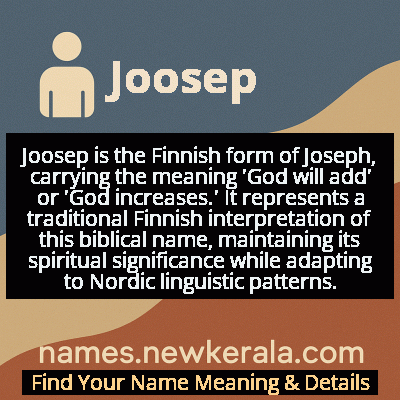Joosep Name Meaning & Details
Origin, Popularity, Numerology Analysis & Name Meaning of Joosep
Discover the origin, meaning, and cultural significance of the name JOOSEP. Delve into its historical roots and explore the lasting impact it has had on communities and traditions.
Name
Joosep
Gender
Male
Origin
Finnish
Lucky Number
8
Meaning of the Name - Joosep
Joosep is the Finnish form of Joseph, carrying the meaning 'God will add' or 'God increases.' It represents a traditional Finnish interpretation of this biblical name, maintaining its spiritual significance while adapting to Nordic linguistic patterns.
Joosep - Complete Numerology Analysis
Your Numerology Number
Based on Pythagorean Numerology System
Ruling Planet
Saturn
Positive Nature
Ambitious, efficient, realistic, and authoritative.
Negative Traits
Materialistic, stressed, confrontational, and can be overly ambitious.
Lucky Colours
Dark blue, black.
Lucky Days
Saturday.
Lucky Stones
Blue sapphire, amethyst.
Harmony Numbers
2, 4, 6.
Best Suited Professions
Business leaders, managers, financial services, law enforcement.
What People Like About You
Leadership, determination, organizational skills.
Famous People Named Joosep
Joosep Aav
Religious Leader
Served as Metropolitan of Tallinn and All Estonia in the Estonian Orthodox Church
Joosep Kärmas
Musician
Renowned Estonian folk musician preserving and innovating Baltic traditional music
Joosep Tiks
Athlete
Competitive Estonian rower representing his country in international championships
Name Variations & International Equivalents
Click on blue names to explore their detailed meanings. Gray names with will be available soon.
Cultural & Historical Significance
Extended Personality Analysis
Individuals named Joosep are typically perceived as embodying a blend of traditional Finnish values and the steadfast qualities associated with their biblical namesake. They often exhibit remarkable reliability and practical wisdom, approaching life with methodical care and deep commitment to their principles. The name suggests someone who is both grounded and spiritually aware—able to navigate practical challenges while maintaining broader perspective. Jooseps are usually seen as patient problem-solvers who value authenticity over superficiality, and who build relationships based on trust and mutual respect. Their personality often reflects the Finnish concept of 'sisu'—a special strength and determination in facing adversity. While they may appear reserved in unfamiliar situations, those who know them well appreciate their dry humor, emotional depth, and unwavering loyalty. The combination of biblical heritage and Finnish cultural context creates a personality profile that balances spiritual depth with pragmatic competence, making Jooseps valued members of their communities and reliable partners in both personal and professional contexts.
Modern Usage & Popularity
In contemporary Finland, Joosep maintains a niche but respected position as a traditional Finnish name with strong cultural and religious connotations. While it has never reached the popularity of more common Finnish names like Johannes or Mikael, it enjoys consistent usage particularly among families valuing linguistic authenticity and cultural heritage. Recent naming statistics show it appearing occasionally in birth registrations, often chosen by parents seeking names that are both traditional and distinctive. The name's usage reflects broader trends in Finnish naming practices, where there's growing interest in reviving traditional forms that had been overshadowed by international variants. Digital globalization has actually strengthened its appeal among some parents as a way to maintain cultural specificity in an increasingly homogenized naming landscape. Its current usage patterns suggest it will continue as a meaningful, if uncommon, choice for families connected to Finnish traditions.
Symbolic & Spiritual Meanings
Symbolically, Joosep carries the profound meaning of 'God will add' or 'God increases' through a distinctly Finnish cultural lens. This represents not just material abundance but spiritual and personal growth—the idea that life brings continuous addition of wisdom, experience, and relationships. The name symbolizes the concept of building upon foundations, whether in family, community, or personal development. In Finnish context, it also represents the preservation and adaptation of tradition—taking an ancient name and making it authentically Finnish. The double 'o' spelling itself becomes symbolic of the Finnish language's unique character and the nation's ability to absorb international influences while maintaining cultural identity. Joosep embodies the symbolic bridge between universal human themes of faith and growth, and the specific cultural expressions of the Finnish people, making it a name that speaks to both individual destiny and collective heritage.

